When it comes to weight loss there are very few supplements that actually work or that have scientific evidence proving their efficacy.
Because there are so few, certain supplements tend to stand out above the rest.
Myoinositol is one of these supplements and it works because it impacts hormones and acts as a secondary messenger in your cells.
Myoinositol not only helps with weight loss but can also be used to treat sex hormone imbalances, PCOS, and mood disorders.
Learn how to effectively and properly use this supplement here:
What is Myoinositol & How it Benefits Your Body
So what is Myoinositol and why is it even worth talking about?
Well, it turns out that this sugar alcohol (yes it’s actually a sugar and about half as sweet as table sugar) has some seriously beneficial side effects if used correctly.
Myoinositol is the most common form of inositol and most of its benefits come from how it interacts with cellular function.
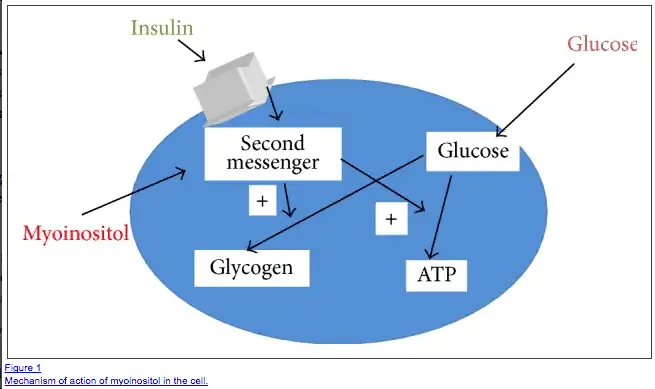
Myoinositol helps regulate a number of cellular processes and is a critically important part of the phospholipid cell membrane (the protective barrier of each cell in your body).
The benefits of myoinositol stem from how it interacts with cells.
In fact, myoinositol used to be considered a member of the B vitamin family (formerly vitamin B8) due to its powerful effects on brain tissue, stress, and mood.
But how do we go from what it does inside the cell to the benefits of weight loss and treatment for PCOS?
Most of the benefits of myoinositol come from how it interacts with various hormones in your body.
You probably know by now that obesity is the result of hormone imbalance (not caloric imbalance).
The same is true for PCOS, which is really just a constellation of multiple hormone imbalances which cause a multitude of symptoms for patients.
So the real power comes from the effects it has on these hormones.
These effects don’t stop at weight loss or treating PCOS, however, and you can see a complete list of the benefits of myoinositol below.
The main benefits of Myoinositol include:
- Helps with weight loss through hormone balancing (1)
- May improve blood pressure (2)
- Normalizes cholesterol levels
- Improve blood glucose
- Reduces insulin resistance
- Increases protective cholesterol (HDL)
- Reduces acne and hirsutism (3)
- Reduces depression & improves other mood disorders (4) (such as anxiety with panic attacks)
- Improves sleeping patterns
- Improves fertility (5)
- Reduces symptoms of PMS/PMDD (6)
We will dig into these benefits in more detail, but first I want to mention two other very important points bout myoinositol.
First:
Myoinositol is a very benign and naturally occurring substance with very few side effects.
Myoinositol can also safely be combined with medications or used by itself for those who prefer a more natural approach.
Because of these attributes, it has tremendous benefits for certain people and should seriously be considered by many people.
And second:
This nutrient is considered “non-essential” which means that you can function without it, but when used in the right amounts you can get benefits that otherwise wouldn’t be available.
This allows for a potential benefit if used in supraphysiologic doses for short periods of time.
3 Main Ways Myoinositol Helps with Weight Loss
Let’s discuss the benefits of myoinositol as it relates to weight loss first…
As you know both weight gain and weight loss are both regulated through powerful hormone messengers in the body.
These “fat hormones” send messages to your brain and tissues to modulate your basal metabolic rate, caloric burn, and where and how much fat you should be storing.
If you are serious about losing weight then it becomes necessary to impact these hormones to achieve long-lasting weight loss.
This is the reason that supplements such as berberine, fish oil, and alpha lipoic acid can help with weight loss (even if used without diet and exercise).
#1. Improves leptin and treats leptin resistance
Leptin is probably the single most important regulator of body fat in your body.
Leptin is a hormone that is secreted from fat cells and is supposed to feedback to your brain to help manage your appetite and how many calories you burn.
Leptin resistance is a state of dysregulation of this hormonal system and one that creates an environment that makes weight loss incredibly difficult unless treated.

Leptin resistance is also very common among patients with hypothyroidism and other patient groups who have difficulty losing weight despite eating healthy and exercising regularly.
Leptin resistance has been shown to cause a condition known as hypothalamic obesity disorder which is far more common than previously thought.
Myoinositol is very important because it is one of the few supplements that can actually help treat leptin resistance.
Very few medications and supplements have been shown to have efficacy when reducing leptin levels, but studies have shown that myoinositol helps lower insulin levels and keeps those levels low after weight loss (7).
One of the major reasons that patients gain weight gain after losing weight is because leptin levels rise after this weight loss which triggers hormonal changes which cause the body to regain the weight.
Taking myoinositol blocks this rise in leptin after weight loss and may help your body KEEP off the weight that you lose.
#2. Reduces insulin resistance
Myoinositol also works by acting as a putative mediator of insulin.
One of the theories for the development of insulin resistance (8) is due to a deficiency in myoinositol.
This theory was created due to the powerful effects that myoinositol has on insulin resistance and blood sugar levels.
Other studies have shown that taking myoinositol prior to a meal high in glucose will actually reduce the rise in insulin (9) after the meal.
This is important because it is this mechanism (the rise in insulin after meals) that creates insulin resistance.

These studies aren’t just limited to women either, they have been done in children and adolescents showing that myoinositol has benefits among almost all age ranges.
But why do we care about insulin anyway?
Insulin, like leptin, is considered a hormone that regulates fat in your body.
High levels of insulin in your body send signals to your fat cells to grow and store extra calories for later use.
Insulin resistance is a state of excess insulin in the body – meaning you have high insulin at baseline.
Consuming food with high levels of insulin directs that energy straight into your fat cells.

Insulin is also implicated in the pathogenesis (the creation) of other issues such as estrogen dominance, low testosterone, PCOS, and even heart disease.
As many as 50% of Americans are insulin resistant – which means there is a high chance that you might have it as well.
Reducing insulin is required if you are insulin resistant and interested in losing weight.
#3. Balances sex hormones
Lastly (and perhaps more importantly) is that myoinositol can directly impact your sex hormones.
I’m talking about testosterone, estrogen, and progesterone (specifically in women, but it also helps men as well).
Myoinositol has been shown to help in the following ways:
- Decrease estrogen levels and improve estrogen dominance (10)
- Reduces LH production which reduces testosterone (especially in women with PCOS)
- Increases sex hormone binding protein synthesis
- Increases ovulation and normalizes the menstrual cycle
But why do these hormones matter for weight loss?
Well, it turns out that estrogen is a powerful hormone that influences your fat cells.
High estrogen causes weight gain and fat growth (especially in the breasts, gluteal, and thigh region).
High estrogen also causes changes to your mood and influences other hormones like cortisol.
Many women in the US suffer from estrogen dominance due to poor diet, insulin resistance, and exposure to endocrine-disrupting chemicals.
Taking myoinositol can help normalize these hormones and therefore improve fat regulation.
Myoinositol, PCOS & Infertility
While myoinositol can be used for weight loss in many patients, it has some very beneficial effects for patients with PCOS.
You can think of PCOS as a combination of two major problems:
#1. Hormone imbalances (11) -> high estrogen, high testosterone (and androgens), low progesterone, infertility, insulin resistance
#2. Metabolic dysfunction (12) -> High cholesterol, weight gain, high blood pressure, abdominal obesity, impaired glucose metabolism
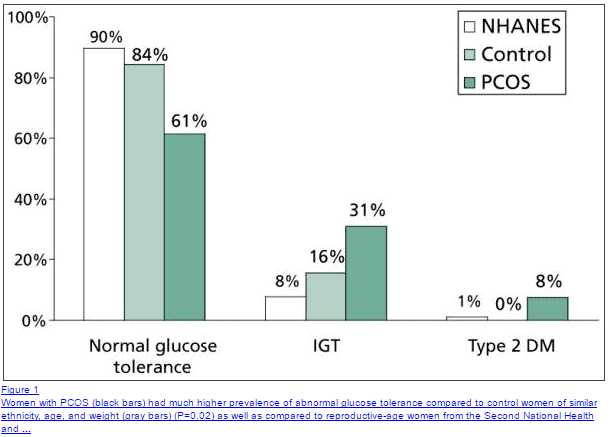
The benefit of myoinositol is that it affects BOTH of these areas.
We already discussed both the hormonal effects (reducing insulin, improving estrogen, normalizing androgens) as well as the metabolic effects (reducing blood sugar, improving cholesterol and blood pressure).
The net effect is that myoinositol can also help with weight loss in patients with PCOS, reduce acne, improve mood, and even reduce male-patterned hair loss.
Another benefit is that myoinositol can be combined with existing therapies (such as metformin) and doesn’t interfere with these medications.
It’s even better tolerated than metformin and is less likely to cause GI issues.
In addition, it might be the treatment of choice for patients who are seeking to get pregnant or want to improve fertility.
Why?
Because myoinositol is one of the few treatments for PCOS that actually treats the symptoms and the root cause of PCOS without negative side effects.

Many patients with PCOS use birth control medication to control their side effects, but obviously, it’s very difficult to get pregnant while on these medications!
Myoinositol offers a better solution for people who wish to get pregnant because it improves fertility and it is very safe to use while trying to conceive.
But how does myoinositol compare to metformin when it comes to improving fertility and increasing pregnancy rates?
Studies have shown that myoinositol is at least AS effective as metformin (13) at improving fertility rates, and it comes with a much better safety profile as well.
How to use Myoinositol Powder + The Best Supplement
In order to get the benefits of this sugar alcohol, you will want to make sure you are using it correctly.
Like other supplements and medications that means you need to get a high-quality product and use it at the right dose for the proper length of time.
When it comes to myoinositol that usually means getting it in powder form.
Why?
Because as a powder you are able to take higher doses (without the need to take 5+ capsules each day).
And remember – myoinositol is the most common form of inositol so you will need to take an inositol supplement at higher doses to get higher concentrations of myoinositol.
I only bring this up so it doesn’t confuse you when you go to purchase myoinositol and you are instead getting an “inositol” supplement.
How to Supplement with Myoinositol
Patients with the following conditions should consider using Myoinositol:
- Patients interested in weight loss or those with weight loss resistance
- Patients with PCOS, high androgens (testosterone or DHEA), or estrogen dominance
- Patients suffering from infertility due to PCOS or endometriosis
- Those with insulin resistance, high fasting blood sugar, or blood sugar issues
- Patients with a personal history of type II diabetes
- Patients with insulin resistance (as evidenced by elevated fasting insulin greater than 5)
- Patients with non-alcoholic fatty liver disease (as evidenced by AST/ALT values > 20)
- Patients with known or suspected leptin resistance
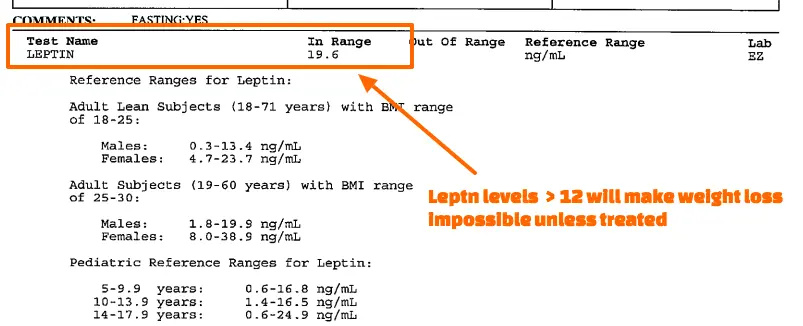
How to Use
- Take up to 2,000mg twice per day (for a total of 4,000mg per day) -> 2 scoops per day of the supplement listed below
- Continue treatment for 3-6 months (or as long as you are noticing improvement)
- For best results combine with other supplements designed to reduce leptin and insulin
- You can also increase inositol bioavailability by using MIC injections (discussed below)
Injection Inositol with B12 + MIC Injections
Lastly, it’s worth discussing a second (and more effective) way to get inositol into your system.
The second way is by using MIC + B12 injections.
MIC stands for methionine, inositol, and choline.
The inositol (along with the other nutrients) may explain why so many people swear by using MIC B12 shots when they are trying to lose weight.
We aren’t as concerned about the other nutrients in this cocktail except to say that they complement inositol very well and should be considered if your primary goal is weight loss.
The real benefit of using MIC B12 shots is that you bypass the first-pass metabolism of the liver and you can get inositol into your system much quicker and at unmetabolized doses.
Who should use MIC B12 shots?
If you have PCOS and/or you are trying to lose weight then this might be an option worth considering.
The best way to use these injections is once per week and in conjunction with the oral inositol supplement listed above.
Remember, inositol is well tolerated so there isn’t a risk of overdose here.
You should be looking to get at least 50mg of Inositol in each injection of MIC + B12.
You can read more about how to use B12 injections for weight loss here.
Back to you
The bottom line?
Myoinositol is a powerful sugar alcohol and supplement that can be added to your existing weight loss regimen to help you lose weight and improve insulin/blood sugar control.
It also has serious benefits for patients with PCOS and other sex hormone imbalances like endometriosis, PMS, and/or PMDD.
If you decide to use myoinositol make sure you purchase it in the powder form and use high enough dosages for at least 3-6 months.
Lastly, if you want to improve absorption and dosage you can try using MIC plus B12 injections weekly.
Now I want to hear from you…
Have you used myoinositol before?
Did it work for you? Why or why not?
Leave your comments below!
Scientific References
#1. https://www.ncbi.nlm.nih.gov/pubmed/18074942
#2. https://www.ncbi.nlm.nih.gov/pubmed/20811299
#3. https://www.ncbi.nlm.nih.gov/pubmed/19551544
#4. https://www.ncbi.nlm.nih.gov/pubmed/11386498
#5. http://onlinelibrary.wiley.com/doi/10.1111/andr.12025/full#andr12025-bib-0018
#6. https://www.ncbi.nlm.nih.gov/pubmed/22031267
#7. https://www.ncbi.nlm.nih.gov/pubmed/18074942
#8. https://www.ncbi.nlm.nih.gov/pubmed/22452173
#9. https://www.ncbi.nlm.nih.gov/pmc/articles/PMC5108849/
#10. https://www.ncbi.nlm.nih.gov/pubmed/19551544?ordinalpos=30&itool=EntrezSystem2.PEntrez.Pubmed.Pubmed_ResultsPanel.Pubmed_DefaultReportPanel.Pubmed_RVDocSum
#11. https://www.ncbi.nlm.nih.gov/pubmed/18074942
#12. https://www.ncbi.nlm.nih.gov/pubmed/26265416
#13. https://www.ncbi.nlm.nih.gov/pmc/articles/PMC5011528/
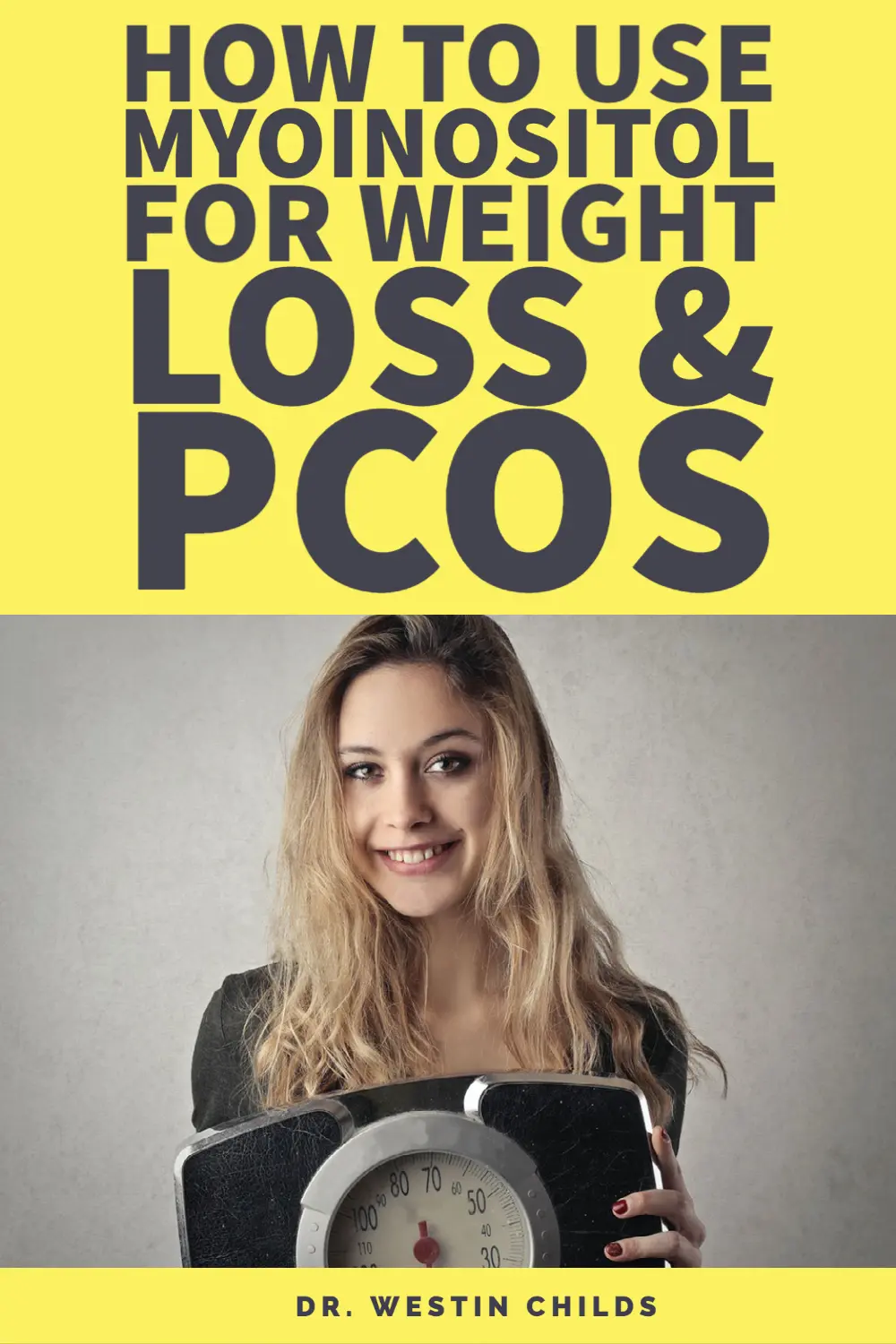
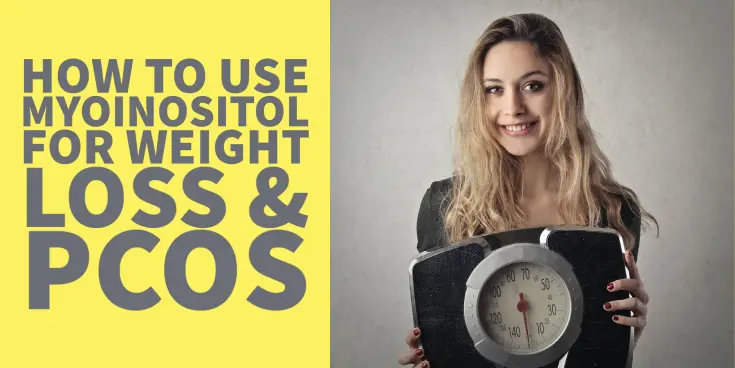
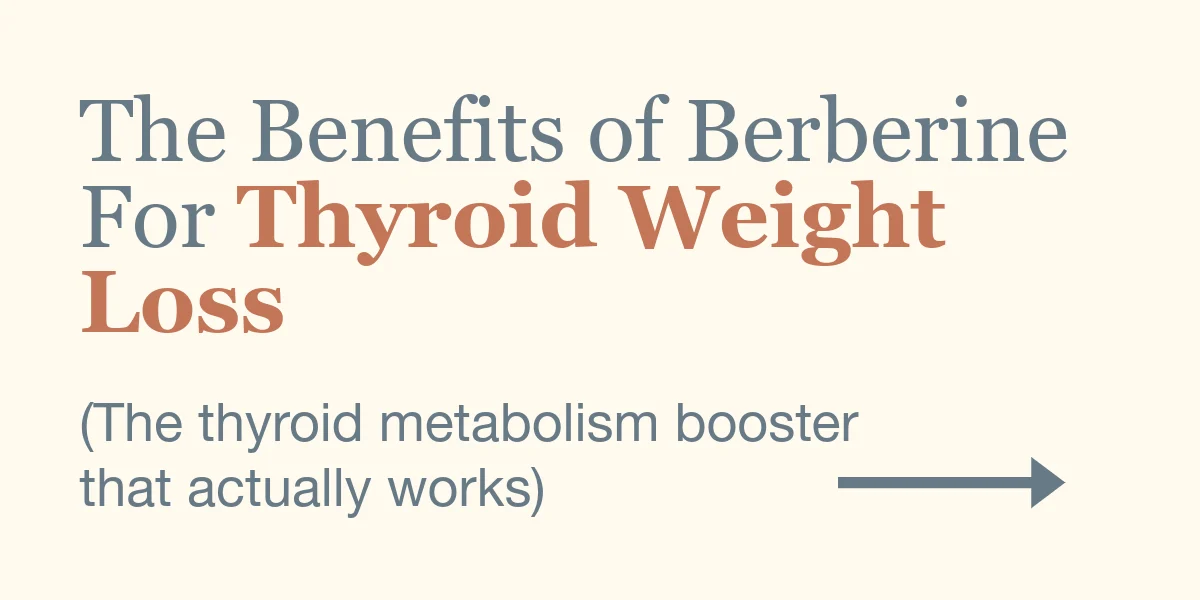

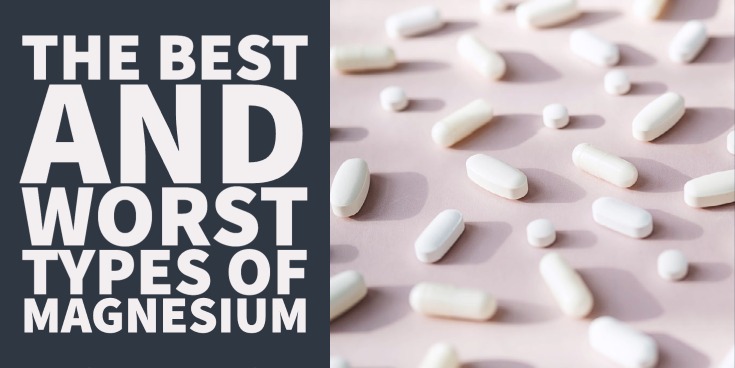

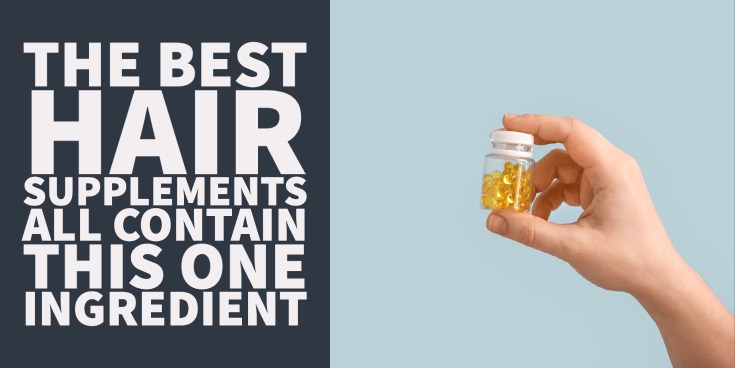
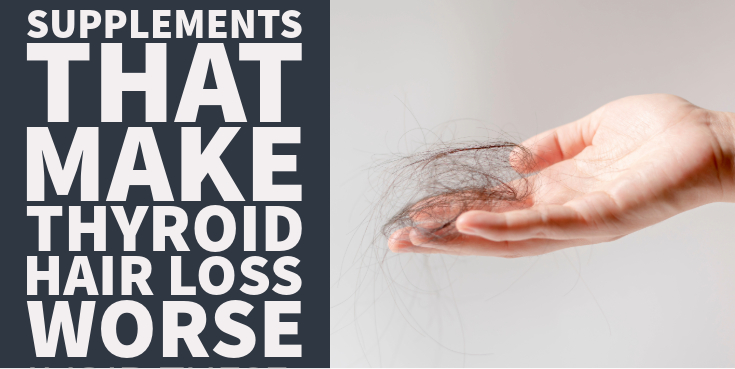

Hey, great post (following and reading all the way from Denmark… where we unfortunately also have PCO 🙂 )
On PCOSDIVA.COM I read about taking D-Chiro-Inositol with Myo-Inositol: “Studies show that in women with PCOS, replacing the lost DCI with a supplement, “improved their insulin resistance and clinical features. ” Caution is necessary with DCI; women with PCOS appear to actually have too much DCI in their ovarian tissue, so supplementing higher doses (600-2400 mg daily) of DCI “progressively worsens oocyte quality and ovarian response.”
I would like to hear your take on that? Is it enough to “just” take Inositol – and for whom will t be great to also take D-Chiro-Inositol?
Thanks in advance 🙂
BEST Mette
I had a question about taking the myoinositol and clomid together. I am currently taking 100mg of clomid along with myoinositol and I was wondering if the myoinositol would effect the clomid in a negative way. For example, would the myoinositol prevent the clomid from making me ovulate since you stated that it reduces LH production?
Sorry if this seems like a silly question, I’m still learning about all these hormones and how they effect the body.
Thank you for your time!
Brittany
First of all, thank you!
What are the hormonal effects of myoinositol in post menopausal women? Would you still recommend it for weight loss? I’m post menopausal, trying to lose 5 to 8 lbs. I’m a health conscious yoga teacher, but lately very tired and have more food cravings that aren’t real hunger. I’m pretty sure there is some kind of imbalance going on.
Hi Adrienne,
It would potentially be beneficial if you had issues with estrogen dominance or insulin/leptin resistance (all of which can occur in post menopausal as well as menstruating women).
Thanks for your response. I suppose I should have mentioned that I’m hypothyroid, taking Naturethroid 2x per day (ttl = about 100mg). I also take DHEA 25 mg, on the advice of my lady dr. Is DHEA contraindicated with myoinosotol? Is hypothyroidism reversible? I’ve been on the meds for 15 years; I don’t feel like they really do the full job of regulating metabolism. Thanks so much again for your time and expertise.
Thank you for the information.
I have PCOS and increased weight for about 30 lb in the last couple of month even though my appetite didn’t change. My current BMI is 24.8
I exercise 2 hours per day, mostly long walking and I eat only 800-1000 calorie per day. But I didn’t have even 1 lb weight loss. So, I am trying to cut more intake calorie and use 4000 inositols per day. Maybe it helps.
The inositol product you recommend above: The newest reviews on amazon say that the product has changes and is not as effective. They say it used to say made in japan but now doesn’t say where it’s made and that now it leaves a lot of residue in the glass like it didn’t dissolve well. Is there another product you would recommend instead of this one?
THANK YOU SO MUCH for all of the articles you have written for thyroid and related issues! You are a God send! You should open a second clinic in North Georgia!
Hi Lori,
This product should work as well: http://amzn.to/2tO8wqx
Dr Childs..is there a updated (since 2017) preferred inositol / selenium supplement that is in high enough dosages to do what this case study had amazing benefits with?
https://drhedberg.com/inositol-selenium-improve-hashimotos-disease/
Hi Sheila,
I do not have any supplements that contain those ingredients at those doses, but Hashimoto’s Ab Rx will eventually be reformulated to contain them.
Hi writing from Dublin Ireland – long term hypo and on synthetic T3 and t4 – weight not shifting and am 30lbs over what I would have been Pre thyroid disease – would this supplement work for hashimotos please? Thx – love your work!
Hi Sinead,
You can see a list of people that I recommend use the supplement here:
“Patients interesting in weight loss or those with weight loss resistance
Patients with PCOS, high androgens (testosterone or DHEA) or estrogen dominance
Patients suffering from infertility due to PCOS or endometriosis
Those with insulin resistance, high fasting blood sugar or blood sugar issues
Patients with a personal history of type II diabetes
Patients with insulin resistance (as evidenced by an elevated fasting insulin greater than 5)
Patients with non alcoholic fatty liver disease (as evidenced by AST/ALT values > 20)
Patients with known or suspected leptin resistance”
It’s less about your thyroid status and more about other co-existing hormone imbalances.
DR childs I take 2600 in myoinositol is this enough to take?
Hi Abby,
2,600mg is a pretty decent dose! The average range is anywhere between 2,000mg and 4,000mg typically.
Good morning,
I’ve just come across your website and have a couple of questions. Ive had an absolutely terrible time with hormones & underactive thyroid. I’m currently on 100 levothyroxine per day, Floroxetine x 3, Ampitriptiline x 3, as well as HRT (had cervical cancer in Dec 2016)and now have early stages of lymphodema. My body doesn’t seem to know if its coming or going and the weight is piling on………… PLEASE HELP
Hi Tracey,
You can learn more about balancing your hormones for weight loss here: https://www.restartmed.com/hormone-mastery/
Hello Dr. Childs. So thankful to have come upon your teaching and hard work! I had my thyroid out in 2009 because they said half of it was in hyper mode. I think they didn’t know what to do with me is all. Now my endroconology office says only levothyroxine is needed and calcitrol( my parathyroids were damaged during surgery). They refuse to consider natural supplements and do not want to test anything other than the TSH and calcium. I live in a rural area, but found a DO two hours away that I’m hoping will help! I appreciate your thyroidecomy article so very much. I eat well and am mainly gluten free and very active, but CANNOT lose weight!! Is it safe to say I should try the inositol? I have always had regular periods and no female issues. But hair has thinned since surgery and my eyes are SO dry and not the same. Thank you again. You are such a blessing!
Hi Shelly,
You might find more helpful information in these posts:
https://www.restartmed.com/fish-oil-weight-loss/
https://www.restartmed.com/berberine-weight-loss/
https://www.restartmed.com/alpha-lipoic-acid-weight-loss/
Is it okay to use inositol if you are post menopausal? I have dealt with an array of health issues that began when I was roughly thirty, and my third child was just months old. Just like with her two sisters before her, I lost my pregnancy weight by my 6 week check up. And then inexplicably something started to go wrong. Without changing my normal, mostly healthy diet, it my activity level, my weight began to increase, slowly at first but then at a much more rapid pace. I cut my intake in half and doubled my activity and it got worse. We were military and I got into see a doctor who seemed to not take the matter seriously, but he did do lab work. It took him eight weeks to get back to me only to tell me he was alarmed because my lipids were high and my cholesterol was 299! I’d had a physical just before my third pregnancy and my cholesterol had been 136. Wonderful test results to hear over the phone because we were changing stations and moving across the country to a completely different state, and just as completely disinterested doctors. They did occasionally yell at me for my high cholesterol, but refused to believe I had never been overweight until just months after losing every last pound I gained with my third daughter. Ten years later I got a GP from heaven who diagnosed my severe hypothyroidism, as well as other major issues unrelated to my weight. I did so well then but it took a long time. Then even with my Synthroid my body began ballooning regardless of which weight loss program or gym I joined. Four years of this has made me so depressed and embarrassed. Finally my doc starter treating me with bio-identical hormone replacement therapy when I tested about zero in progesterone and testosterone. Can this inositol supplement be used along with hormone replacement? Thank you for reading my long post. -Mel
Hi Mel,
Yes, using myoinositol is fine if you are post menopausal and it can be used in conjunction with other hormones.
So I’m confused is inositol the same thing as myoinositol? Thank you
Hi Janne,
From the post:
“So what is Myoinositol and why is it even worth talking about?
Well it turns out that this sugar alcohol (yes it’s actually a sugar and about half as sweet as table sugar) has some seriously beneficial side effects if used correctly.
Myoinositol is the most common form of inositol and most of its benefits come from how it interacts with cellular function. “
Hi Dr Child’s, I ordered the one you posted and some reviews say it has rice flour in it..I didnt see that listed since I can not have grains because I am following AIP…Do they know something about the product..since taking for 2 weeks I do feel bloated..Thanks for all your help
Hi, what would a safe dose be for children? I have a 9yo w v limited diet, autism and gaining weight around her middle despite not having much refined sugar (mostly flour, sigh). She is constantly exhausted and I am hoping to get some help for her soon but in the meantime, will add ‘safe’ supplements. It’s so hard to find info for children who need help.
Hi Katharine
While I do not know anything about your daughter, I would look at a MTHFR gene test to identify some road blocks in her biochemistry, she may well have yeast and digestive issues and an Organic Acids urine test to look at her cellular metabolism. A great go to test for clinical nutritionists.
Good luck!
Is this safe to use if we have not been diagnosed to have pcos?
And will it interact with my birth control? I have the nexplanon implant in my arm, and am not wanting to get pregnant at this time….
Hi H Clark,
Yes, you can use it if you don’t have PCOS and it shouldn’t interfere with your medications.
I’m 10 years past a hysterectomy leaving a left ovary. The only symptom I don’t have is the fertility issue (obviously). Even Lapband 8 years ago didn’t last for me after a car accident in 2013. I’m 60lbs. Gained and can’t lose in spite if diet & exercise I AM able to do.
I am post menopausal and I also have Hypothyroidism therefore I take Synthroid 137 mag
Is Myoinositol alright to take if I’m no longer having periods? I stopped having my menstrual cycle about 11 years ago. I really struggle with weightloss.
Thank you so much…..
Hi Marie,
Yes, inositol (or myoinositol) can be taken if you are menopausal.
I was diagnosed with pcos 10 years ago. at the time I was married and we were trying to conceive with no luck. I was put on metformin and had AWFUL sides effects so I stopped that treatment and have been untreated since with the exception of oral birth control from the health department. Until 3 or 4 years ago I was VERY over weight, I lost about 100 pounds and my periods have returned and are pretty regular. I was seen by a pcos specialist in march of 2017 all he did was run labs but all my labs came back within normal range except for my vitamin D which was low and my blood pressure runs very low now. My question is is in your opinion would trying this treatment be effective in helping me ovulate?
hi,Dr Childs.
I too have been doing a lot of research because I have pcos, leptin resistance, insulin resistance. the reading I’ve been doing recommends 2000mg inositol and 50 mg d chiro inositol BID for the best results. do you agree,or is myoinositol alone or with folic acid enough to be successful with weight loss? thank you
Dr. Childs,
You state that myoinositol should be taken for at least 3-6 months. If you have PCOS will you need to take it longer or even the rest of your life?
Also can you have PCOS without being overweight? Maybe something to consider is a more indepth post on PCOS. Thank you for your time.
Hi Shanna,
You don’t necessarily have to use it for the rest of your life but if it’s helping control your symptoms then it can be used for longer than the 3-6 months referenced here.
I will add a post about PCOS to the list!
Hi Dr. Childs,
Unfortunately I cannot get my hands on Myo inositol, but I’m able to get inositol. How much of inositol would I need (dosage) to get the same results?
Thanks in advance! 🙂
HI!!! So I found this product called Premama for fertility it is 2000 mg myo-inositol and 200 mg folic acid that you mix in at least 12 oz of any non-carbonated drink. My husband and I are trying to have a baby but I have PCOS anyway how long does it generally take to for the myo-inositol to effect your ovulation and fertility? In other words how long should I give this stuff a shot before I move on or add other meds/methods
I am 31 and was diagnosed with PCOS at 16. I have always had somewhat of a weight issue since around 12-13, however it has gotten worse with age. My husband and I have been trying to have a baby for about 6 years, but at this point, I am more concerned with my weight. My doctors have tried so many medications and nothing has worked. My current primary placed me on Phentermine, I have lost weight but now in month two, I have noticed no changes. I eat pretty good, with very rare cheat moments, if ever. I work out. And still nothing. Will taking myo and d-chiro inositol along with the Phentermine harm me?
Hi Mandee,
It probably won’t cause any harm but I don’t think it will help normalize your weight completely if those other therapies you listed haven’t helped.
I really enjoyed listening to you on YouTube. You explain things so that it’s easy to understand. I wanted to know if you recommend any capsule form?
Thank you
Hi Gina,
Glad you enjoy the content! I generally recommend the powder because it’s easier to get to the higher dosages.
Dr. Childs: I have an autoimmune disease and have now developed small fiber peripheral neuropathy (horrific affliction) and have been put on the evil gabapentin. I’ve started gaining weight and cravings (which I didn’t have before) are out of control So it’s a double edge sword. Do you know if ininositol (or myoinositol) will help lose weight and reset metabolism while on gabapentin?
Hi PJ,
It probably will not help resolve your weight issue but it may help slightly.
Can we take myoinositol with glucophage 500 mg….do they process negatively with each other?
Hi Faryal,
They shouldn’t interfere with one another.
Hi Dr. Childs. I have PCOS. Am I able to use inositol with metformin?
Ho Alishia,
It probably won’t be an issue to use them together but if there is any question you can touch base with your current provider.
Hi Dr. Childs,
Great article. I had a quick question for you. Can you continue to take Myoinositol once pregnant? I’ve heard of women continuing to at least 12 weeks minimally.
Thanks!
Hi
Thank you for the article. I am 45 years old and have PCOS since I’ve been 27 years old. I have been my own advocate and have done so much research for this disease as most of my Drs just tell me to lose weight. I have tried everything, I am now fasting 15 hours a day. This is my second week and I have given up snacking and am eating mostly healthy. I have lost 2 pounds in 2 weeks, so discouraging…but I’m not going to give up. Saturday I started taking myo-inositol with D-Chiro inositol 40:1 ratio. I’m taking the Ovasitol brand. I’m hoping this will help with all my PCOS problems. I will come back and give my results. My A1c was 5.6 so hopefully it will be lower by the end if April.
Hi,
I am 56 years old and in menopause. At age 14 I was diagnosed with PCOD. I was able to have 2 children and had no weight issues. Now that I am in menopause my healthy sex drive is completely gone and I have packed on pounds rapidly within the last year. What product and dosage would you recommend to aid in my weight loss.
Hi Kay,
While supplements can certainly aid in improving your symptoms they are not a 100% substitute for the decline in hormones that occurs during menopause. You can read more about that here: https://www.restartmed.com/menopause-weight-gain/
Thanks for this groovy article, Dr. Childs! I was wondering…can I take myoinositol while taking desiccated thyroid and is it safe to take both together or at separate times? I take 30 mg of NDT. Will this help me to lose weight? Thanks for your time–keep up the great knowledge that you pass on to us unselfishly! Blessings!
Hi there, I want to clarify that a supplement should say “myo-inositol,” such as the one from Pure Encapsulations. I’m taking a powder form from NOW Foods that just says “inositol,” and so I take that to mean it’s a different compound. If that’s the case, I will certainly switch.
I am 66 yrs old and have had horrible PCOS issues my whole life time. I am currently at the highest weight I have ever been. My fasting sugar runs about 110, my cravings are so strong and I feel worn out constantly and also suffer from depression. Could Myoinositol help with these issues? I so desperately need help with my cravings and weight issues.
I have been taking the myo inositol powder along with choline and methionine capsules for the past 6 months and I swear by it. I’ve lost 55 lbs. I did cut out all processed food as well but I really believe this supplement combo jumpstarted my weightloss in the beginning and helps keep me from cheating and I’ve never been able to do that!
I’m confused because a lot of women with PCOS have LOW estrogen and I looked at the links you’ve provided in this article, to the the studies and it shows that it increases E2.
Dr Westin, please can you explain more? Can I take my-inositol if I have low estrogen?
Hi Neeta,
I think you’re confused regarding this condition. The majority of patients have high E2 not low. Or they have high estrogen RELATIVE to progesterone.
Hi Dr. Westin, Actually she is not confused and I have this same exact question. I have underlying PCOS ( a mild level) and have LOW estrogen. Not high. So I have the same question as Neeta which is, can we take Myo-Inositol if we have low estrogen? Thank you!
Hi Ram,
You can but it probably won’t have much of an impact. If you have a low estrogen version of PCOS then you would want to figure out what the underlying cause is and treat that: https://www.restartmed.com/types-and-causes-of-pcos/
I took inositol a year ago for just a couple of weeks and I actually GAINED weight. I tried it again awhile back and it did the same thing. I was only taking about 1000 mg/day. I want to start it again. I have Hashimoto’s and was told by my functional dr that I have PCOS. I’ve not ovulated/had a period in 10 years but because my FSH, LH, and estrogen levels, she says I’ve not gone through menopause (I’m 50) and my hair is falling out big time. My endocrinologist has my thyroid levels where they need to be so I know my hairfall is from estrogen dominance. The last time I was able to raise my progesterone my hair came back incredible. So I guess I just need to know what dosage I should be taking to help with the estrogen dominance (my testosterone is normal to low and I’m thin). I guess I just need to push past the weight gain and hope it helps my hair come back? Or could it just be a water weight gain by starting something new? Thanks for your help!
Dr. Childs,
I have PCOS and could not tolerate metformin so I started using Myoinositol 2000mg BID and lost 16 lbs in about 3 months (216>200). I noticed an immediate decrease in cravings and most importantly my cycles regulated for the first time since stopping birth control. It had been months since then and I have not lost a pound. I recently did a glucose tolerance test and it was elevated, as was my a1c which went from a 5.7>6.1. For the last month I have been particularly conscious about cutting out added sugars, watching what I eat, and I even started taking morning walks. I would think after doing all this I would notice a drastic change but alas not 1lb lost. I did not gain weight but this is frustrating.
My cycles are still regular
My thyroid is under control with Synthroid
Im following a vegan diet, while being conscious of carbs
I added a lunchtime dose of myoinositol (1000 mg)
I noticed no increase in cravings etc.
WHY AM I NOT LOSING WEIGHT?
Should I try taking more myoinositol? What is the safest amount that I can take? Should I try metformin again? I feel so lost. Any insight would be greatly appreciated.
I am low on testosterone, 63, need to lose 10 pounds, but gain muscle back and am taking testo gain… Can I take myoinosotol with it to help hormones and lose weight?
Hi Dr
I recently saw your YT video on this, and finally got some proper sensing on how much myo-inositol I should be taking. For about a month I was following the Jarrow’s inositol pills serving of just 1 of 750mg. Would greatly appreciate if you could provide clarity on the following though please:
1) As an Asian, I eat white rice almost every day. I found out rice has inositol though. If I take four pills of my Jarrow’s Inositol (750mg x 4) and eat rice daily, should I cut down on my pill intake, even though you mentioned there’s no such thing as an overdose?
2) Can I take 4 pills of Jarrow’s Inositol at one go, or do I really have to split it to two timings? I have a tendency to forget to take night time vitamins/pills.
In your first list of benefits you have blood pressure listed 2x. Did you mean blood sugar for one of those?
Hi Lisa,
I just really wanted to highlight its effects on blood pressure! I’m kidding, it was just a typo and should have been blood glucose like you mentioned. It’s all fixed now!
Hi Dr. Childs,
Would you recommend Myoinositol for Children as well?
My son (10years) has ADHD and he‘s at the begining of his puberty and gaining weight. He also has extreme mood swings.
Best regards,
Anna
You know – I was put on Metformin about 25 years ago – after a few days I started shaking – thought I had Parkinsons – stopped taking the Metformin and the symptoms went away. And sugar alcohols – really? I am super sensitive to sugar alcohols – they do a number on my gut and I’ve cut them out of my diet completely. You should mention the possibility of sugar alcohol sensitivity and to look out for it.
Well, there’s a lot of good info here… BUT you are WRONG stating “myoinositol doesn’t cause any GI issues.” Get on Reddit and READ FOR YOURSELF the many women who suffered GI issues as a result from myoinositol, including myself. I’ve started and stopped 3 times (with no other diet, exercise, supplement/Rx changes) and every time I took it, I had significant gallbladder area pain, extreme bloating, diarrhea, and sometimes constipation. I also developed acne (I’m 51 and haven’t had acne since I was a teenager, and gained 19 lbs in 2 months!!!! My blood pressure has shot up, and I’ve felt panicky, jittery, and anxious at time. I have PCOS, and am insulin resistant, so this should not have been the case. I am no alone and there are women in PCOS support groups online, on Reddit, and elsewhere who experienced the same or similar issues such as myself. Like EVERYTHING, there CAN be side effects for some people. It is not accurate to state, “It does not cause any GI issues.”
Hi Jennifer,
You are right. What I was trying to imply is that it’s better tolerated and less likely to cause GI symptoms compared to metformin but that’s not what was explicitly stated. I have updated the text to make it more clear.